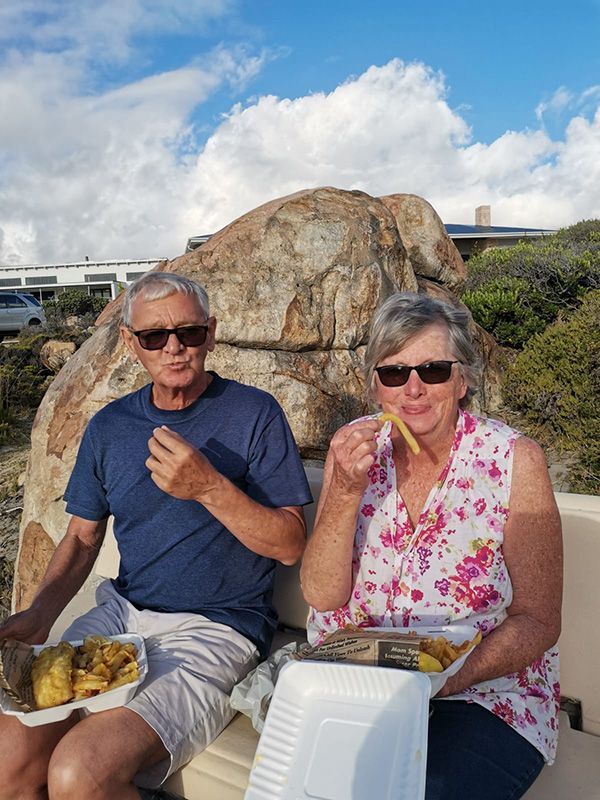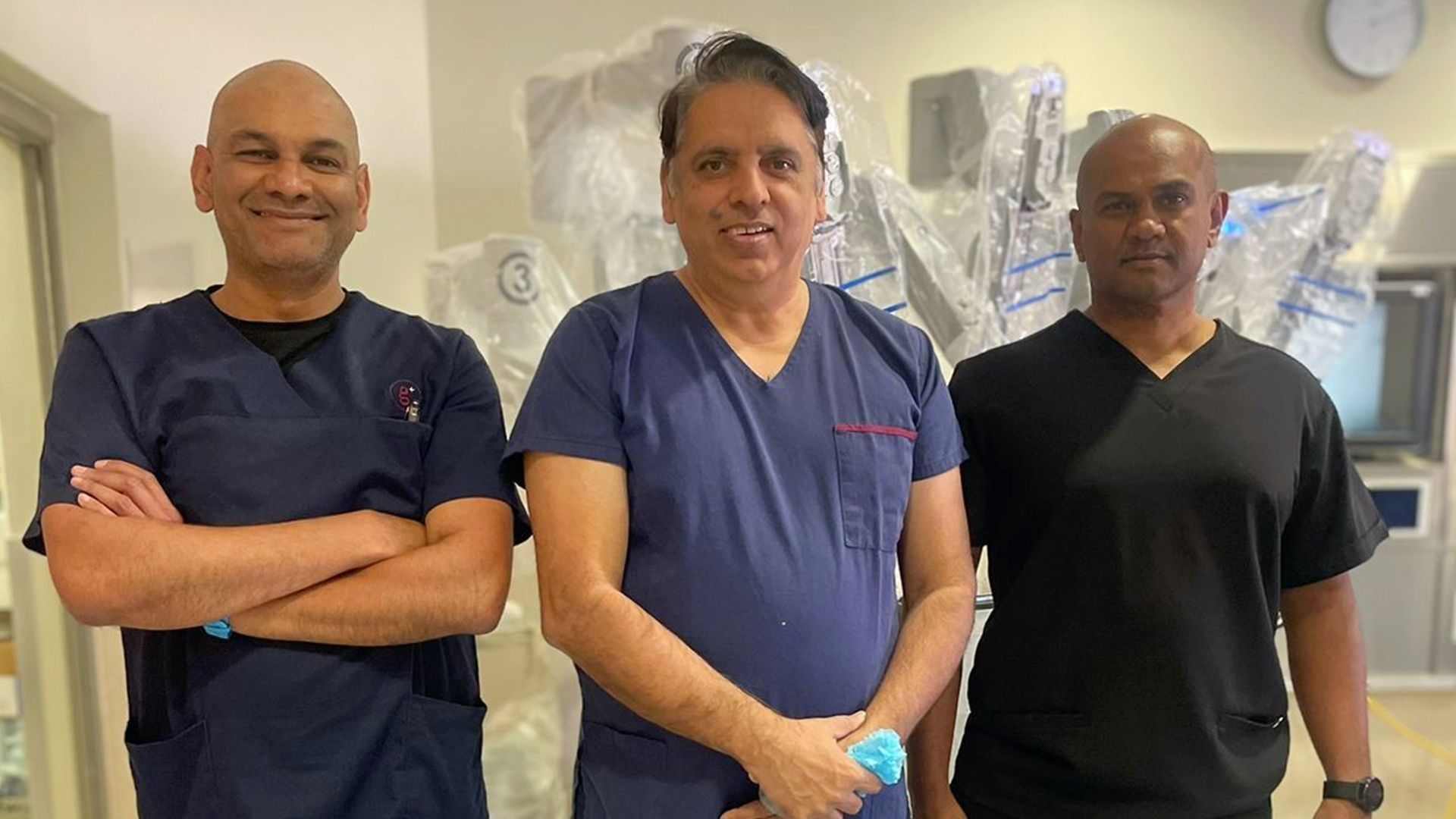Rapid rectal surgery recovery with robotics – and sunlight
Netcare Waterfall City colorectal robotic surgeons: (Left to right) General surgeon Dr Bhavesh Gordhan, visiting head of minimal access and robotic colorectal surgery at the European Academy of Robotic Colorectal Surgery (EARCS), Professor Amjad Pravaiz, and specialist general and bariatric surgeon, Dr Sudha Naidoo, performed Mr Horn’s robotic-assisted procedure at Netcare Waterfall City Hospital.
Precision tech and the sun’s healing power for lower colon resection
The latest robotic technology and the earth’s ancient sun both played a role in the rapid post-surgical recovery of a man being treated for rectal cancer. One of Colin Horn’s greatest concerns when he was diagnosed was that he might need a colostomy bag after the surgery to remove the 124mm section of his lower colon where the tumour was growing.
“I have a positive mindset generally, and I had been under the knife for a quadruple heart bypass years ago. When Dr Sudha Naidoo and I discussed the options and potential risks of the surgery to remove the diseased part of my colon, my single biggest fear was that I would be left reliant on a stoma and colostomy bag and how that would affect my life,” says Mr Horn, 74.
“When a person has rectal cancer, the surgical field is very close to the nerves involved in sphincter function, bladder control and erectile function. The robotic assisted approach makes a difficult surgery deep in the narrow confines of the pelvis a little easier to perform, and the capabilities of this technology fortunately, allowed us to avoid these critical nerves and the need for a stoma in Mr Horn’s case,” explains robotically trained general and bariatric surgeon Dr Naidoo.
Dr Naidoo and fellow da Vinci Xi robotic accredited general surgeon Dr Bhavesh Gordhan performed the low anterior resection procedure at Netcare Waterfall City Hospital in October 2022, with Professor Amjad Pravaiz, proctor and head of minimal access and robotic colorectal surgery at the European Academy of Robotic Colorectal Surgery (EARCS).

Colin Horn is pictured enjoying fish and chips while watching the sunset with his wife Bev on a recent holiday to Pringle Bay. Mr Horn was surprised at how quickly he was able to get back to daily life after having robotic-assisted colorectal surgery for cancer at Netcare Waterfall City Hospital in 2022.
The flagship da Vinci Xi is the latest robotic surgical system and the fourth generation of the pioneering da Vinci produced by Intuitive and locally distributed by Medhold.
“The system allows us to be deeply immersed in the surgical field, with the visuals magnified ten times and in 3D so we can see much better than the human eye. The system enables us to work precisely and comfortably in the narrow confines of the pelvis through small punctures in the skin without placing much pressure on the abdominal walls,” Dr Naidoo says.
“After Mr Horn’s procedure, we placed him in the intensive care unit for observation and initial recovery, and the next day he was already upbeat, walking around and talking – we even had to ask him to take it easy. With the traditional or laparoscopic approach to this operation, recovery tends to take longer, and patients often require more postoperative pain medication.”
“I went into the theatre just before noon and woke up at 11 pm that night, not feeling too bad, although I was not sure where I was at first. I was in ICU for three nights, with the nursing sister at my bedside, monitoring me 24 hours a day as Dr Naidoo wanted to be cautious,” Mr Horn recalls.
“I had been dreading the surgery and the recovery, but it was all good – unbelievably good. The doctors were very kind to my wife and me, and it meant a great deal to me in easing the stressful situation,” he says.
After four nights in Netcare Waterfall City Hospital, Mr Horn was discharged, and a week and a half later, he returned to Dr Naidoo for a check-up and to remove his stitches.
“Although the marks left by the incisions were only approximately 25mm, Dr Naidoo said the wound might open slightly, and I was most intrigued when he advised me to sit in the sun for 10 minutes for the next few days to help it bind and heal – and he was absolutely correct.
“After robotic assisted surgery with the pinnacle of state-of-the-art technology, now to be using the natural power of the sun - which is billions of years old - as part of the process struck me as quite an astounding contrast,” Mr Horn says.
Dr Naidoo adds that the healing properties of fresh air and sunshine are well documented. Within weeks of the operation, he was back to enjoying walking around his home suburb of Lonehill, Johannesburg, as recommended for his heart health.
Mr Horn’s oncologists prescribed a course of radiation therapy and chemotherapy to attack any remaining cancer cells after the tumour and affected section of the colon was removed. Dr Naidoo advised that he avoid nitrates and processed foods going forward and have annual scopes, MRI and CT scans, and blood tests to monitor his condition carefully.
“I was surprised how quickly I was able to get back to my usual activities after the operation, and I’m very grateful that I was referred to Dr Naidoo and was a candidate for this advanced option at Netcare Waterfall City Hospital, where I was very well looked after,” Mr Horn says.
Dr Naidoo emphasises that the da Vinci Xi robotic surgical system cannot independently move or perform any action. “We always have two robotically trained surgeons present as part of the team for these procedures, and Dr Gordhan and I always work together on robotic assisted surgeries. We are in full control at all times; it is a superb tool that allows us to operate with less physical trauma,” he says.
“While any surgical procedure has some risk, many potential complications associated with traditional surgery are avoided. Internationally, a lot more procedures are being done with the robotic assisted approach, however it is only recommended as an option where there is clear benefit in terms of the complexity of the surgery and where it is appropriate for the individual patient’s condition,” Dr Naidoo notes.
Apart from the colorectal procedures, Dr Gordhan and Dr Naidoo also utilise da Vinci Xi’s superior technology for pelvic organ prolapse and rectal organ prolapse repair procedures.
Managing director of Netcare’s hospital division, Jacques du Plessis, says the applications for robotic surgical technology have grown rapidly in recent years. “It is very gratifying to see the difference these sophisticated procedures are making to patients like Mr Horn and how investment in this technology is paying off in terms of extending the capabilities of robotic surgeons practising at Netcare hospitals.”













